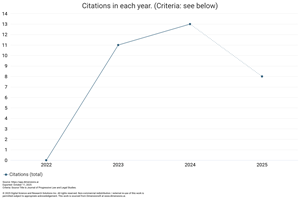Issuance of Building Approval (PBG) for Development on Land Affected by Street Plans in Surabaya City
DOI:
https://doi.org/10.59653/jplls.v2i03.1062Keywords:
Building Approval, Building Construction Permit, Urban Planning, Legal Compliance, Road DevelopmentAbstract
This research examines the issuance of Building Approval (PBG) for developments on land affected by road plans in Surabaya City, focusing on the legal consequences and status of such buildings. Employing a normative legal research methodology, the study scrutinizes relevant laws and regulations, including Surabaya Mayor Regulation Number 34 of 2023 and Government Regulation (PP) Number 16 of 2021. The findings reveal that buildings erected on government land without the required IMB or PBG are in violation of these regulations, which may result in their demolition and a lack of legal protection. The study highlights that unauthorized constructions disrupt urban planning and entail legal repercussions under the Job Creation Law, Article 29 Paragraph 1 point c. Buildings lacking IMB and PBG are subject to demolition as they are considered invalid without regional government authorization. The research emphasizes the necessity for rigorous supervision by the Mayor of Surabaya to ensure compliance. Additionally, it explores the broader significance of these permits as essential steps in converting urban spatial policies into operational frameworks, pivotal for road development and urban planning.
Downloads
References
Al Fatih, M., Hermawan, A., Firdaus, E., & Hantono, D. (2021). The Impact of Building Permit Violations on Railroad Bank Settlements in Tanjung Priok Jakarta. National Seminar on Science and Technology 2021, November 2021, 1–6.
Andryan. (2021). Law and Public Policy. CV. Pustaka Prima.
Depdagri. (2023). Undang-Undang Republik Indonesia Nomor 6 Tahun 2023 Tentang Penetapan Peraturan Pemerintah Pengganti Undang-Undang Nomor 2 Tahun 2022 Tentang Cipta Kerja Menjadi Undang-Undang (176733; pp. 1–1127). Departemen Dalam Negeri Republik Indonesia.
Dewi, N. P. E. W., & Wita, I. N. (2019). Imposition of Sanctions in Spatial Planning. Journal of Legal Science, 7(4), 1–17.
DPUKP. (2020). Refresh and Review: Legal Basis of Building Permit (IMB). Dinas Pekerjaan Umum Perumahan dan Kawasan Permukiman.
Hudalah, D., & Sujarto, D. (2014). Planning as a Process. 1–36. http://repository.ut.ac.id/4257/1/PWKL4202-M1.pdf
Jasril, M., Yohanis., & Adriani, A. (2023). Implementation of Building Construction Permit (Imb) Policy in Lubuk Kilangan Sub-district Padang. Japan: Journal of Administration and Governance, 1(1), 18–27. https://doi.org/10.55850/japan.v1i1.77
Peraturan Menteri. (2023). Peraturan Menteri Pekerjaan Umum Dan Perumahan Rakyat Republik Indonesia Nomor 5 Tahun 2023 Tentang Persyaratan Teknis Jalan Dan Perencataan Teknis Jalan.
Peraturan Pemerintah Republik Indonesia. (2021). Peraturan Pemerintah (PP) Nomor 16 Tahun 2021 Tentang Peraturan Pelaksanaan Undang-Undang Nomor 28 Tahun 2002 Tentang Bangunan Gedung.
Peraturan Walikota Surabaya. (2023a). Peraturan Walikota Surabaya Nomor 34 Tahun 2023 Tentang Tata Cara Pengenaan Sanksi Administratif Pelanggaran Peraturan Daerah Kota Surabaya Nomor 7 Tahun 2009 Tentang Bangunan.
Peraturan Walikota Surabaya. (2023b). Peraturan Walikota Surabaya Nomor 50 Tahun 2023 Tentang Tata Cara Pengenaan Sanksi Administratif Pelanggaran Peraturan Daerah Kota Surabaya Nomor 7 Tahun 2009 Tentang Bangunan.
Rahmayanti, I., & Lubis, A. W. (2022). Building Construction Permit Retribution and its Problems Study at the Investment and One-Stop Integrated Service Office of Medan City. VISA: Journal of Vision and Ideas, 3(2), 272–287. https://doi.org/10.47467/visa.v3i3.1550
Rohalia, R. D., & Meilani, N. L. (2023). Implementation of Building Approval Policy (PBG) in Bukittinggi City. Tambusai Journal of Education, 7, 4517–4525.
SIP LAW FIRM. (2021). Building Construction Permit Process. SIP LAW FIRM.
Situngkir, R. (2021). Transition of Building Construction Permit to Building Approval Based on Law Number 11 of 2020 on Job Creation. Iuris Studia: Journal of Legal Studies, 2, 664–672. https://doi.org/10.55357/is.v2i3.192
Sufa, S., Praratya, A., Sumartias, S., & Ahmad, J. (2020). Empowering Residents of The Former Dolly’s Prostitution Localization as an Effort of Government Economic Responsibility of Surabaya City. 1–7. https://doi.org/10.4108/eai.9-10-2019.2291101
Syafrizal, A., & Marto, S. (2021). Implementation of Building Approval Policy (PBG) in Palembang City. Journal of Administrative and Information Sciences (Junaidi), 1(1), 71–79. https://ejournal.stiabpd.ac.id/index.php/junaidi/article/view/9
Syahrini, S. (2019). Theories of Local Government. Muhammadiyah Sidenreng Rappang University, 23, 1–17.
Tahulending, J. C., Sulangi, C., Paendong, M., Mangole, A., & Lumanauw, P. (2022). Planning of Transitional Road in Manado State Polytechnic Area. Journal of Applied Civil Engineering, 4(3), 113. https://doi.org/10.47600/jtst.v4i3.468
Taufik, M. (2022). Public Policy Law - Theory and Praxis. Tanah Air Beta.
UMA. (2022). Legal Sanctions For Not Having A Building Permit. Fakultas Hukum Universitas Medan AreA.
UU RI. (2020). UU RI. Undang Undang Republik Indonesia Nomor 11 Tahun 2020 Tentang Cipta Kerja.
Wahyuni, W. (2022). Get to Know More about Public Policy and Its Implementation. Hukumonline.
Downloads
Published
How to Cite
Issue
Section
License
Copyright (c) 2024 Ida Fatmawati, Rusdianto Sesung

This work is licensed under a Creative Commons Attribution-ShareAlike 4.0 International License.
Authors who publish with this journal agree to the following terms:
- Authors retain copyright and grant the journal right of first publication with the work simultaneously licensed under a Creative Commons Attribution-ShareAlike that allows others to share the work with an acknowledgement of the work's authorship and initial publication in this journal.
- Authors are able to enter into separate, additional contractual arrangements for the non-exclusive distribution of the journal's published version of the work (e.g., post it to an institutional repository or publish it in a book), with an acknowledgement of its initial publication in this journal.
- Authors are permitted and encouraged to post their work online (e.g., in institutional repositories or on their website) prior to and during the submission process, as it can lead to productive exchanges, as well as earlier and greater citation of published work (See The Effect of Open Access).
























